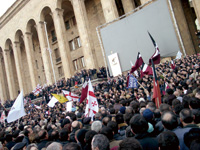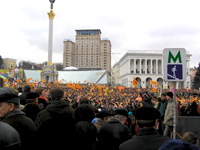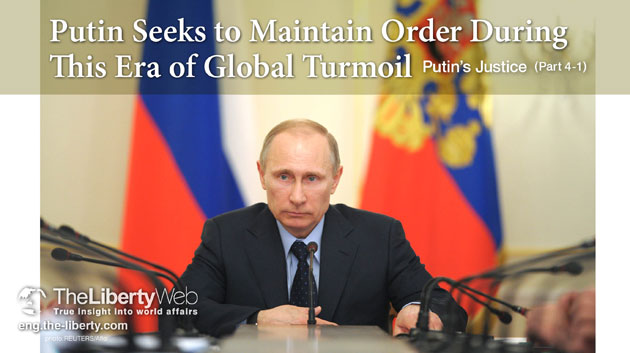Putin Seeks to Maintain Order During this Era of Global Turmoil (Part 4-1)
President Putin is being criticized for “trying to destroy the World Order”. In Part 4, we explore Putin’s new world order.
“The God of Destruction of World Order, Emperor Putin” (Newsweek Japan edition April 8 issue)
“With Putin’s Regime, Russia is Entering a New Era of Nationalism and Revanchism” (English Financial Times Magazine, April 30)
Western nations see President Putin as “destroying the World Order, and threatening world peace” for annexing Crimea through the threat of force. Russia plays a central role in the “Eurasian Economic Union” which is set to launch in January of next year, and seeks political and economic integration among former Soviet republics. This too is criticized by the West as the “revival of the Soviet Union”.
The West is More Extreme in its Intervention in Other Countries
Certainly, it is wrong to take territories by force from other countries. However, what happened in Crimea isn’t quite so simple. For instance, since 90% of Ukrainian troops stationed in Crimea wanted to join the Russian army, armed conflict did not occur, and the rest of the soldiers returned to Ukraine. The annexation into Russia was done through a referendum, and the move reflected the will of the people.
In comparison, intervention by the West into other countries is more extreme.
In 2003, citing Iraqi President Saddam Hussein’s uncooperative response to UN inspectors looking for weapons of mass destruction, the US and Britain went to war without a UN resolution. Consequently, over 100,000 Iraqis were killed, and President Hussein was executed.
America’s shadow can often be seen behind the various democratic revolutions in the former Soviet Union and in the Arab world.
(removed “In”) Georgia, a former Soviet Republic, saw the Rose Revolution in 2003, which came about when large scale demonstrations broke out after election fraud was uncovered. A US-backed interim government came to power, but it was revealed later that US investor George Soros was providing funding for the revolution.
It seems that the U.S. is once again involved in setting up the interim government in Ukraine. A wiretapped conversation concerning the interim government personnel, between U.S. Assistant Secretary of State Nuland and the U.S. ambassador to Ukraine, has been uploaded to YouTube. They are heard saying that “Yatsenyuk is the best candidate to head the government.” Yatsenyuk indeed was later appointed to be Prime Minister.
Former Secretary of State Henry Kissinger, known as a leading figure among the realist school of international politics, criticized America’s interventionism in the Washington Post, saying “the new system in Ukraine should be decided democratically by its citizens.”
America can be seen behind the democratic revolutions in the former Soviet Union and the Arab world

2003, the “Rose Revolution” in Georgia. Protests erupted in response to accusations that Parliamentary elections were rigged, and President Shevardnadze was forced to resign.

2004, the “Orange Revolution” in Ukraine. There were accusations of election fraud in the presidential elections which saw Mr. Yanukovych win, and protests erupted. During the second runoff, Yushchenko was elected president. It is the same pattern as the Rose Revolution.
From America’s Unipolar Moment to the Era of Multipolarity
After the end of the Cold War, the world saw a unipolar moment led by the United States. While the U.S. continues to exert much influence on other countries, their power is seen to be weakening in recent years.
In a speech given in 2007, Putin stated the following. “Russia can no longer be a unipolar power” and that “in a world that is increasingly multipolar, Russia should strive to become one of the poles”. It can be seen from these words that Russia sees itself as one among many leading nations, and they are not seeking a Soviet-style hegemony.
Even within a world that is increasingly multipolar, it is necessary for Russia, Japan, and India to gain strength in order to maintain order in East Asia where China continues its military expansion.
However, it seems that the United States wants to continue to pursue its hegemony, and they criticize not only Russia, but the heads of Japan and India as “fundamentalists” and “nationalists”.
When Prime Minister Shinzo Abe, who sought to authorize the right of collective-defense, visited the Yasukuni shrine, America commented that they were “disappointed,” and the Western media followed up with criticism.
Also, the next Indian Prime Minister, Narendra Modi, who won the election in a landslide, developed Gujarat as its prime minister. But the United States in the past had refused to issue a visa, saying that he did not stop a riot based on Hindu supremacy.
While the West placed economic sanctions against Russia, Mr. Putin expressed gratitude to China who did not join in on the sanctions.
Mr. Ishigouoka said that “if the United States corners Russia to the wall, Russia will ally itself with China, and will oppose Japan and the US. That will be the worst case scenario for the West.”
In order to avoid such a scenario, instead of choosing between the US and Russia, Japan should strive to mediate between the two through a more proactive diplomacy.
A Commonly held understanding :
Putin destroys peace and order in the world
The Result of Part 4-1:
Putin anticipates a new world order and is making efforts to make Russia one of the leaders



















